De Amerikaanse schrijver David Sedaris werd geboren in Binghamton, New York, op 26 december 1956. Zie ook alle tags voor David Sedaris op dit blog.
Uit: Me Talk Pretty One Day
“No one else had been called, so why me? I ran down a list of recent crimes, looking for a conviction that might stick. Setting fire to a reportedly flameproof Halloween costume, stealing a set of barbecue tongs from an unguarded patio, altering the word on a list of rules posted on the gymnasium door; never did it occur to me that I might be innocent.
“You might want to take your books with you,” the teacher said. “And your jacket. You probably won’t be back before the bell rings.”
Though she seemed old at the time, the agent was most likely fresh out of college. She walked beside me and asked what appeared to be an innocent and unrelated question: “So, which do you like better, State or Carolina?”
She was referring to the athletic rivalry between the Triangle area’s two largest universities. Those who cared about such things tended to express their allegiance by wearing either Tar Heel powder blue, or Wolf Pack red, two colors that managed to look good on no one. The question of team preference was common in our part of North Carolina, and the answer supposedly spoke volumes about the kind of person you either were or hoped to become. I had no interest in football or basketball but had learned it was best to pretend otherwise. If a boy didn’t care for barbecued chicken or potato chips, people would accept it as a matter of personal taste, saying, “Oh well, I guess it takes all kinds.” You could turn up your nose at the president or Coke or even God, but there were names for boys who didn’t like sports. When the subject came up, I found it best to ask which team my questioner preferred. Then I’d say, “Really? Me, too!”
Asked by the agent which team I supported, I took my cue from her red turtleneck and told her that I was for State. “Definitely State. State all the way.”
It was an answer I would regret for years to come.
“State, did you say?” the agent asked.
“Yes, State. They’re the greatest.”
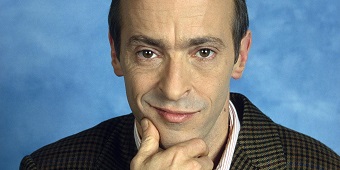
David Sedaris (Binghamton, 26 december 1956)
De Amerikaanse schrijfster Elizabeth Kostova werd geboren op 26 december 1964 in New London, Connecticut. Zie ook alle tags voor Elizabeth Kostova op dit blog.
Uit: The Historian
“Reluctantly, my father agreed. He talked with my teachers and with Mrs. Clay, and reminded me that there would be ample time for my homework while he was in meetings. I wasn’t surprised; for a diplomat’s child there was always waiting to be done. I packed my navy suitcase, taking my schoolbooks and too many pairs of clean kneesocks. Instead of leaving the house for school that morning, I departed with my father, walking silently and gladly beside him toward the station. A train carried us to Vienna; my father hated planes, which he said took the travel out of traveling. There we spent one short night in a hotel. Another train took us through the Alps, past all the white-and-blue heights of our map at home. Outside a dusty yellow station, my father started up our rented car, and I held my breath until we turned in at the gates of a city he had described to me so many times that I could already see it in my dreams.
Autumn comes early to the foot of the Slovenian Alps. Even before September, the abundant harvests are followed by a sudden, poignant rain that lasts for days and brings down leaves in the lanes of the villages. Now, in my fifties, I find myself wandering that direction every few years, reliving my first glimpse of the Slovenian countryside. This is old country. Every autumn mellows it a little more,in aeternum, each beginning with the same three colors: a green landscape, two or three yellow leaves falling through a gray afternoon. I suppose the Romans—who left their walls here and their gargantuan arenas to the west, on the coast—saw the same autumn and gave the same shiver.
When my father’s car swung through the gates of the oldest of Julian cities, I hugged myself. For the first time, I had been struck by the excitement of the traveler who looks history in her subtle face.”

Elizabeth Kostova (New London, 26 december 1964)
De Amerikaanse schrijver Henry Miller werd geboren op 26 december 1891 In New York. Zie ook alle tags voor Henry Miller op dit blog.
Uit: Sexus
“The power which we long to possess, in order to establish the good, the true and the beautiful, would prove to be, if we could have it, but the means of destroying one another. It is fortunate that we are powerless. We have first to acquire vision, then discipline and forbearance. Until we have the humility to acknowledge the existence of a vision beyond our own, until we have faith and trust in superior powers, the blind must lead the blind. The men who believe that work and brains will accomplish everything must even be deceived by the quixotic and unforeseen turn of events.
They are the ones who are perpetually disappointed; no longer able to blame the gods, or God, they turn on their fellow men and vent their impotent rage by crying “Treason! Stupidity!” and other hollow terms. The great joy of the artist is to become aware of a higher order of things, to recognize by the compulsive and spontaneous manipulation of his own impulses the resemblance between human creation and what is called “divine” creation.
In works of fantasy the existence of law manifesting itself through order is even more apparent than in other works of art. Nothing is less mad, less chaotic, than a work of fantasy. Such a creation, which is nothing less than pure invention, pervades all levels, creating, like water, its own level.
The endless interpretations which are offered up contribute nothing, except to heighten the significance of what is seemingly unintelligible. This unintelligibility somehow makes profound sense. Everyone is affected, including those who pretend not to be affected. Something is present, in works of fantasy, which can only be likened to an elixir. This mysterious element, often referred to as “pure nonsense,” brings with it the flavor and the aroma of that larger and utterly impenetrable world in which we and all the heavenly bodies have their being.”.
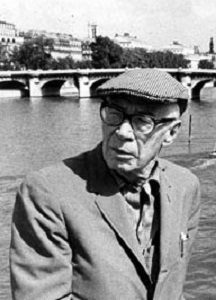
Henry Miller (26 december 1891 – 7 juni 1980)
De Duitse dichter Rainer Malkowski werd geboren op 26 december 1939 in Berlijn-Tempelhof. Zie ook alle tags voor Rainer Malkowski op dit blog.
Am Sonntag leere Chausseen
Am Sonntag leere Chausseen.
Die Stille in den Zementwerken.
Auf den Koppeln rann der Regen
strähnig
in rostende Badewannen.
Sieben Jahre vergingen.
Ich arbeitete, aß, trank, schlief.
Ich starrte auf die dringlich
nickenden Pappeln am Horizont:
Ausrufezeichen, die lange
bereitstanden.
Ich begriff allmählich
für welche nicht
mehr zu unterdrückenden
Sätze.
Uit: Ein Tag für Impressionisten
Etwas von der Ruhe
Fabres,
dem der Nachmittag verging
über der Beobachtung
einer Sandwespe.
Auch Fabre wußte nicht,
was das ist: die Zeit.
Aber er ertrug es vielleicht
besser,
weil er so wenig
für sich selber brauchte.
Ein sehr beschäftigter alter Mann
auf einem Stück Provenceerde.
Was die Mühe lohnt,
konnte er
mit bloßem Auge erkennen.
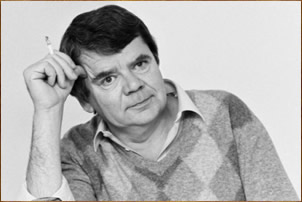
Rainer Malkowski (26 december 1939 – 1 september 2003)
De Duitse schrijver Mani Beckmann (pseudoniem Tom Finnek) werd geboren op 26 december 1965 in Alstätte/Westfalen. Zie ook alle tags voor Mani Beckmann op dit blog.
Uit: Teufelsmühle
“Vor et was mehr als dreißig Jahren, 1974, musste das alte Bauernhaus meiner Großeltern, Heinrich und Anna Vortkamp, dem Neubau einer Landstraße zwischen der münsterländischen Kreisstadt Altheim und dem niederländischen Enschede weichen. Das winzige und windschiefe Häuschen, das von allen im Dorf nur Molenkotten* genannt wurde, hatte mehrere hundert Jahre an dieser Stelle im Ahlbecker Bruch gestanden. Einige Heimatkundler behaupteten gar, bei dem Kotten handele es sich neben der gotischen Dorfkir-che und der an der holländischen Grenze gelegenen Wassermühle um das älteste Gebäude des Dorfes. Alle Proteste, Petitionen und Leserbriefe an die lokalen Zeitungen nützten jedoch nichts, das ur-alte backsteinerne Kötterhaus mit dem niedrigen Schindeldach, der kleinen Holzscheune nebenan und dem verrotteten Brunnen vor der Tür wurde niedergerissen und dem Erdboden gleichge-macht, ebenso wie das umliegende Moor trockengelegt und die Feuchtwiesen dräniert wurden. Nur eine knorrige alte Eiche ne-ben der Landstraße, direkt am Abzweig zum Dorf Ahlbeck, deutet heute darauf hin, wo einst der Molenkotten zu finden war. Meine Großeltern zogen in die nahe gelegene, in den fünfziger Jahren für die Vertriebenen gebaute Hölderlinsiedlung, wo sie jedoch wenig später, in kurzem Abstand zueinander, verstarben. Obwohl ich da-mals erst sechs Jahre alt war, habe ich noch sehr genaue Erinne-rungen an den Bauernhof mit seinen niedrigen Decken, winzigen Butzenscheiben und rußgeschwärzten Wänden, und diese Erinne-rungen sind unauslöschlich mit einem Koffer aus braunem Leder verbunden.”
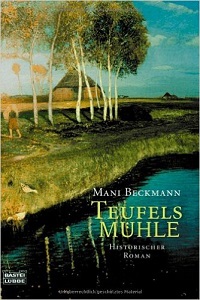
Mani Beckmann (Alstätte, 26 december 1965)
Cover
De Cubaanse schrijver, essayist en musicoloog Alejo Carpentier werd geboren in Havana op 26 december 1904. Zie ook alle tags voor Alejo Carpentier op dit blog.
Uit: The Kingdom of This World (Vertaald door Harriet de Onís)
“The marvelous, manufactured by sleight of hand, by juxtaposing objects ordinarily never found together: the old, fraudulent story of the fortuitous encounter of the umbrella and the sewing machine on an operating table,which engendered ermine spoons, snails in a rainy taxi, the lion’s head on the widow’s pelvis in Surrealist exhibitions. Or, even more to the point, the literary marvelous: the king in Sade’s Juliette, Jarry’s supermacho, Lewis’s monk, the hair-raising theatrical props of the English gothic novel: ghosts, immured priests, lycanthropy, hands nailed to the castle door.
The result of attempting to arouse the marvelous at all costs is that the thaumaturges become bureaucrats. Invoked by means of cliched formulas that turn certain paintings into a monotonous mess of drooping clocks, seamstress’ dummies, or vague phallic monuments, the marvelous is stuck in umbrellas, or lobsters, or sewing machines, or wherever, on an operating table, in a sad room, in a stony desert. Miguel de Unamuno said that memorizing rule books indicated a poverty of imagination.
Today there are codes for the fantastic based on the principle of the donkey devoured by the fig ( proposed in the Chants de Maldoror as the supreme inversion of reality), codes to which we owe Children Menaced by Nightingales or Andre Masson’s Horses Devouring Birds.
But we should note that when Andre Masson tried to draw the jungle of Martinique, with its incredible entangling of plants and the obscene promiscuity of certain fruits, the marvelous truth of the subject devoured the painter, leaving him virtually impotent before the empty canvas.”
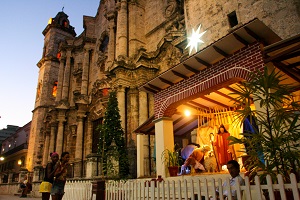
Alejo Carpentier (26 december 1904 – 24 april 1980)
Kersttijd in Havanna
Zie voor nog meer schrijvers van de 26e december ook mijn vorige twee blogs van vandaag.
